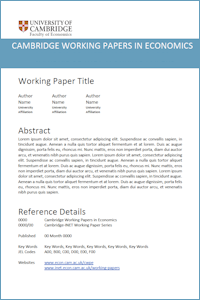
Todd, P., Zhang, W.
Distributional Effects of Local Minimum Wages: A Spatial Job Search Approach
CWPE2265
Abstract: This paper develops and estimates a spatial general equilibrium job search model to study the effects of local and universal (federal) minimum wage policies on employment, wages, job postings, vacancies, migration/commuting, and welfare. In the model, workers, who differ in terms of location and education levels, search for jobs locally and in a neighboring area. If they receive remote offers, they decide whether to migrate or commute. Firms post vacancies in multiple locations and make offers subject to minimum wage constraints. The model is estimated using multiple databases, including the American Community Survey (ACS) and Quarterly Workforce Indicators (QWI), and exploiting minimum wage variation across state borders as well as time series variation (2005-2015). Results show that local minimum wage increases lead firms to post fewer wage offers in both local and neighboring areas and lead lower education workers to reduce interstate commuting. An out-of-sample validation finds that model forecasts of commuting responses to city minimum wage hikes are similar to patterns in the data. A welfare analysis shows how minimum wage effects vary by worker type and with the minimum wage level. Low skill workers benefit from local wage increases up to $10.75/hour and high skill workers up to $12.25/hour. The greatest per capital welfare gain (including both workers and firms) is achieved by a universal minimum wage increase of $12.75/hour.
Keywords: spatial equilibrium, minimum wage, labor relocation, commuting
JEL Codes: J61 J63 J64 J68; R12 R13
Author links: Weilong Zhang
PDF: https://www.econ.cam.ac.uk/research-files/repec/cam/pdf/cwpe2265.pdf 
Open Access Link: https://doi.org/10.17863/CAM.91986
